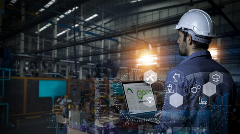Don't Fear Disruption: Change Propels Industry

We’re experiencing the largest wave of industrial disruptions the world has ever seen: artificial intelligence (AI), the Industrial Internet of Things (IIoT) and augmented reality (AR) are just a few of the technologies changing the way we do business.
From big data to bitcoin and blockchain, the decisions you make right now will influence your business trajectory (and success) for the next decade and beyond.
Breaking Through Boundaries
Without doubt, the biggest disruption in industrial automation is the breakdown of boundaries between operations technology (OT) and information technology (IT) world, enabled by mobility and the cloud.
Every other disruption is a result of that breakthrough:
- Analytics to use the data
- Virtual reality, AR, mixed reality, wearables and mobile devices to display data where it’s needed
- Cybersecurity to help ensure the data is secure
- International standards to make the exchange of data easier and less costly
- Machine learning and AI to automate decision-making around data
Disruption: It’s How We Improve
Industry needs disruption. Agile companies that introduce new ideas to shake-up the status quo make us all better.
We’ve seen how retail changed with online ordering and next-day delivery. Virtual education is making school more accessible and affordable to the masses.
Any business that hasn’t considered how the cloud, mobility and big data will change its business model is in for a rough ride.
The International Data Corporation (IDC) predicts that by 2020, we’ll create 1.7 megabytes of new data every second for every person on the planet.
Digital transformation will put 20 billion devices online by 2020 (some estimates are as high as 40-50 billion). That’s five connected devices for every person.
This transformation requires people comfortable with disruption in all forms:
- We used to build fences around robots; now collaborative robots (or cobots) are working next to and collaborating with humans
- As we move closer to custom, made-to-order products, manufacturing must become more flexible leveraging sophisticated CAD, modeling and simulation to ensure products are made correctly the first time
- As we connect more things together, we need standards that support the interconnection and semantic data. These standards can be as valuable as innovation – maybe more
- We’re preparing for jobs that haven't been invented yet (the Institute for the Future estimates that 85% of the jobs in 2030 haven’t been created)
How do we handle all of this change? We can become overwhelmed; or we can use emerging and proven technology to get deeper insights that will make us more innovative than ever before.
Path to Value Creation
In a recent study by Manpower of 18,000 employers in 43 countries, 90% expect to be affected by digitization in the next two years, and 83% of manufacturers will maintain or increase headcount. That shouldn’t be a surprise, since IoT technologies are predicted to create $4 trillion in value.
That value comes at a cost: Business processes that worked for years are outdated. There’s no choice about adopting digital technologies. It’s how well you embrace disruption that will predict future success – or failure.
All of the data and analytics available – without proper connectivity – can add to manufacturing overhead. To avoid this "hidden factory" of costs, control engineers now must understand how to connect to IT applications, configure firewalls and plan defense in depth.
Employees need foundational skills that allow them to use tools like VR and AR to simulate experiences that would be expensive and time consuming to gain.
Bottom line: We all must be (or get) comfortable with transformation that expects innovators constantly to question the status quo.
Contact Us for a competitive edge on your future.










